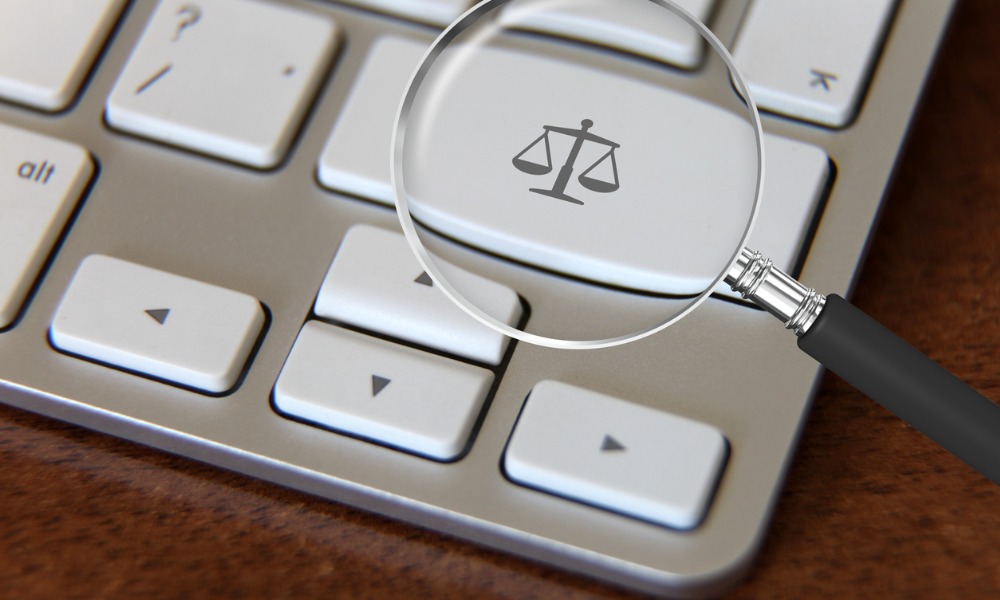We get it – finding a lawyer can be daunting and frustrating. It can be stressful, too, on top of a looming legal case. But with the right tools, you can find a lawyer that is right for your needs.
This guide will break down the process on how to find a lawyer in Canada, with a focus on your specific province or territory. Lawyers can also use this as a client education piece, especially when they need to make referrals.
How to find a good lawyer
Here are some steps to follow if you’re looking for a lawyer in Canada:
- Understand your legal needs
- Look for possible nearby lawyers
- Check the lawyer’s credentials and qualifications
- Meet the lawyer
- Assess the possible lawyer-client relationship
We’ll discuss each of these steps below. As a starting point, you can check our monthly Special Editions for a glimpse of the best lawyers and firms per practice area. Here’s what we released in September 2024:
Aside from checking our Special Edition pieces, using our Lexpert’s directory of the best lawyers in Canada is one of the best tools to find a lawyer in the country. We'll share a step-by-step guide on how to use this directory later in this article.
Meanwhile, let’s go over each of the steps on how to find a good lawyer:
1. Understand your legal needs
The first thing you’ll have to think about is the type of legal services you need. This is also anchored on the question “Do I really need a lawyer for my problem?”
It’s important that you’re settled on these questions. Once you’ve found a lawyer, the first question they’ll probably ask is “What do you need?” or “What do you want to do?” With a lot of legal possibilities and services available, you should know what you want or need.
Let’s say you’re a contractor on a construction project and you haven’t been paid. You’d rather not go to court. What you need from a lawyer is advice on alternative methods to resolve construction disputes to avoid a court case.
This is also helpful when you’re already looking for a lawyer, since they’re usually classified according to their legal practice areas. These practice areas can be considered their specialties or the field of law they chose to work in.
But what if you’re unsure in the first place, or don’t really have an idea of your possible solutions to your legal problems? Then, you’ll just have to be frank about it when consulting with your lawyer.
Check if you need to hire a lawyer
Once you have an idea of what legal solution you’ll probably need, the next question is: do you need a lawyer? And, in most cases, the answer would be yes.
To help you check if going to your nearest lawyer is the best thing to do, consider the following questions:
Do I need to go to court?
While self-representation is not entirely prohibited, some types of court actions would require counsel in court. Having a lawyer by your side is helpful.
Do I have to negotiate with the other party?
There are instances where a relationship that was once warm (e.g., business partners, married couples) turns sour, and talking with the other party leads nowhere. In this case, having a lawyer represent you would be a better option.
Are there other approaches that I can pursue?
You may have read somewhere or heard from someone to do this or that to resolve your legal problem. However, each case is unique; getting a lawyer’s advice on the next steps is the more prudent thing to do.
Am I in a situation that I’m unsure of?
When you’re confronted with a situation where your gut tells you that you’ll probably need a lawyer, then call one. For example, when the other party in a contractual dispute or personal injury case is making you sign some piece of paper, call a lawyer! or when you’re charged with a crime or civil suit and have no idea what to do.
If you're from Ontario, learn how to hire a lawyer in Ontario in this guide.
2. Look for lawyers in the area
Here are some common ways to find a lawyer nearby:
- lawyer directories: online search engines and law websites like Lexpert which can also rank lawyers according to their practice areas
- referrals: this is usually word of mouth, which can be from your friend, family member, person in a similar situation, or from a lawyer in a different practice area
Lexpert’s directory of best lawyers
To help you find a lawyer in your area, you can easily use Lexpert’s directory of the best lawyers in the country. This peer-reviewed directory groups lawyers according to practice area and province, which can trim down your choices when looking for a lawyer.
Here’s a guide on how to use Lexpert’s directory:
Go to Lexpert.ca

Click on the Rankings page
 Choose the practice area from the drop-down menu
Choose the practice area from the drop-down menu
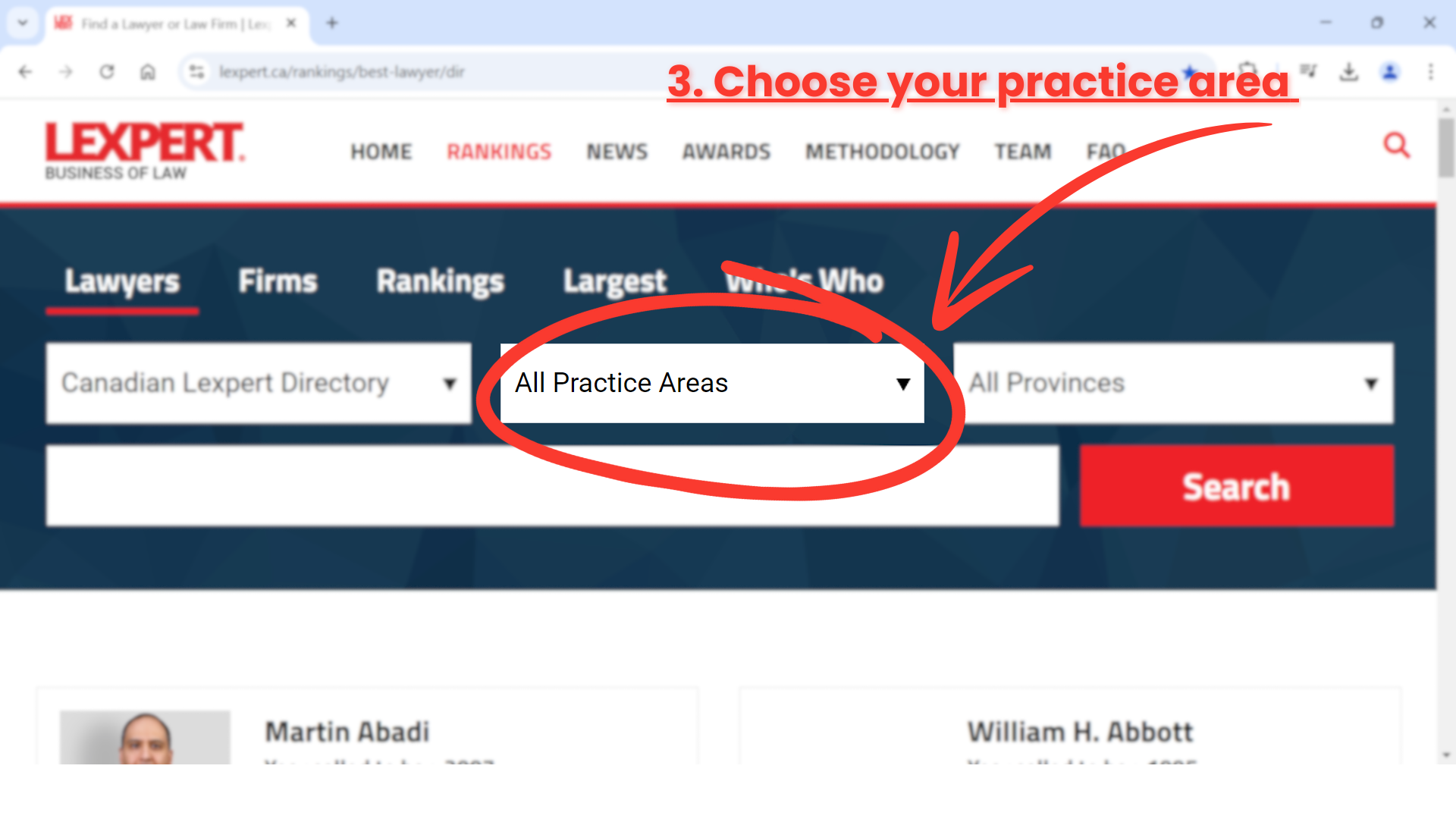
Choose your province in the next drop-down menu
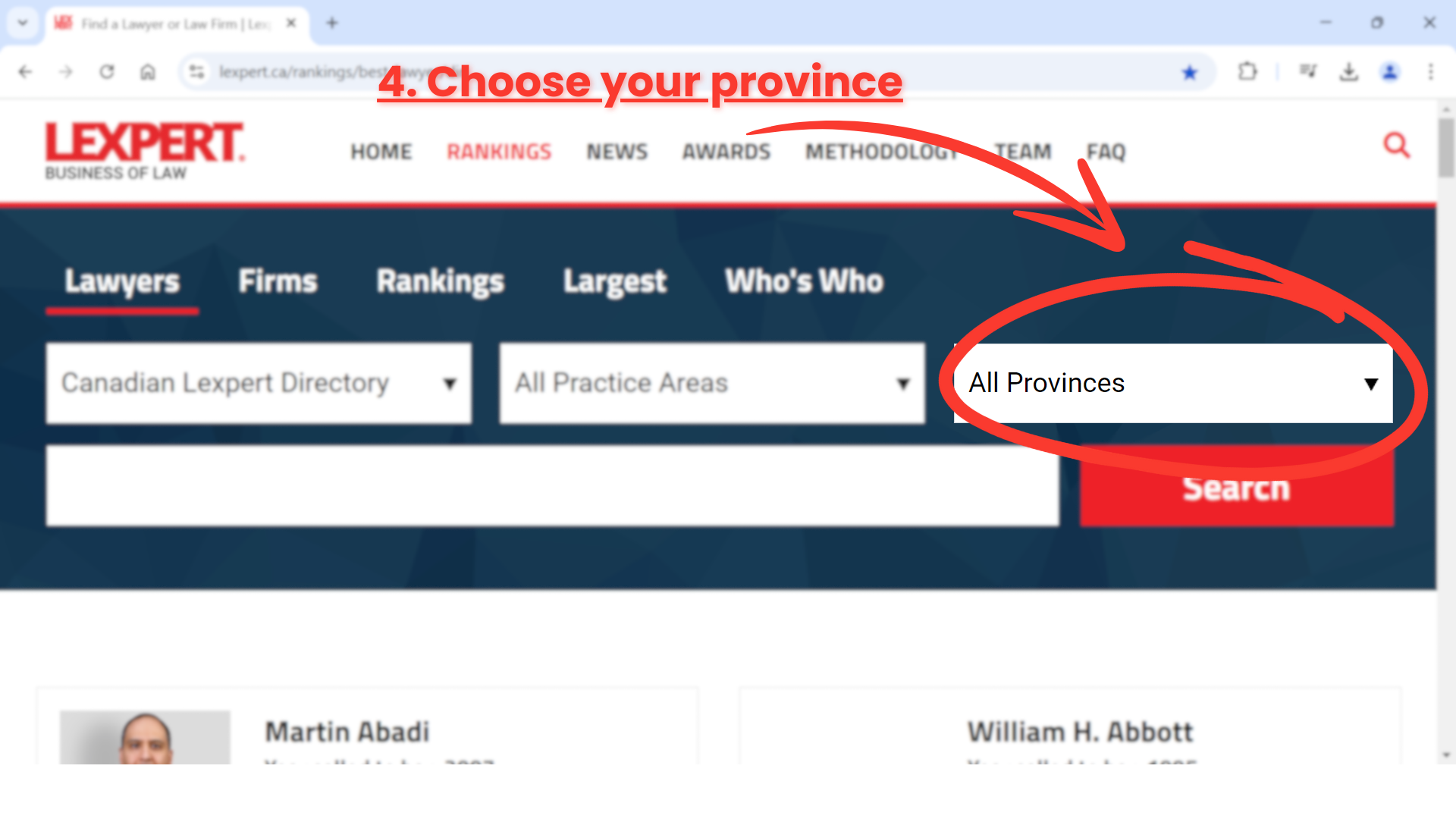 Alternatively, look for law firms instead of lawyers
Alternatively, look for law firms instead of lawyers
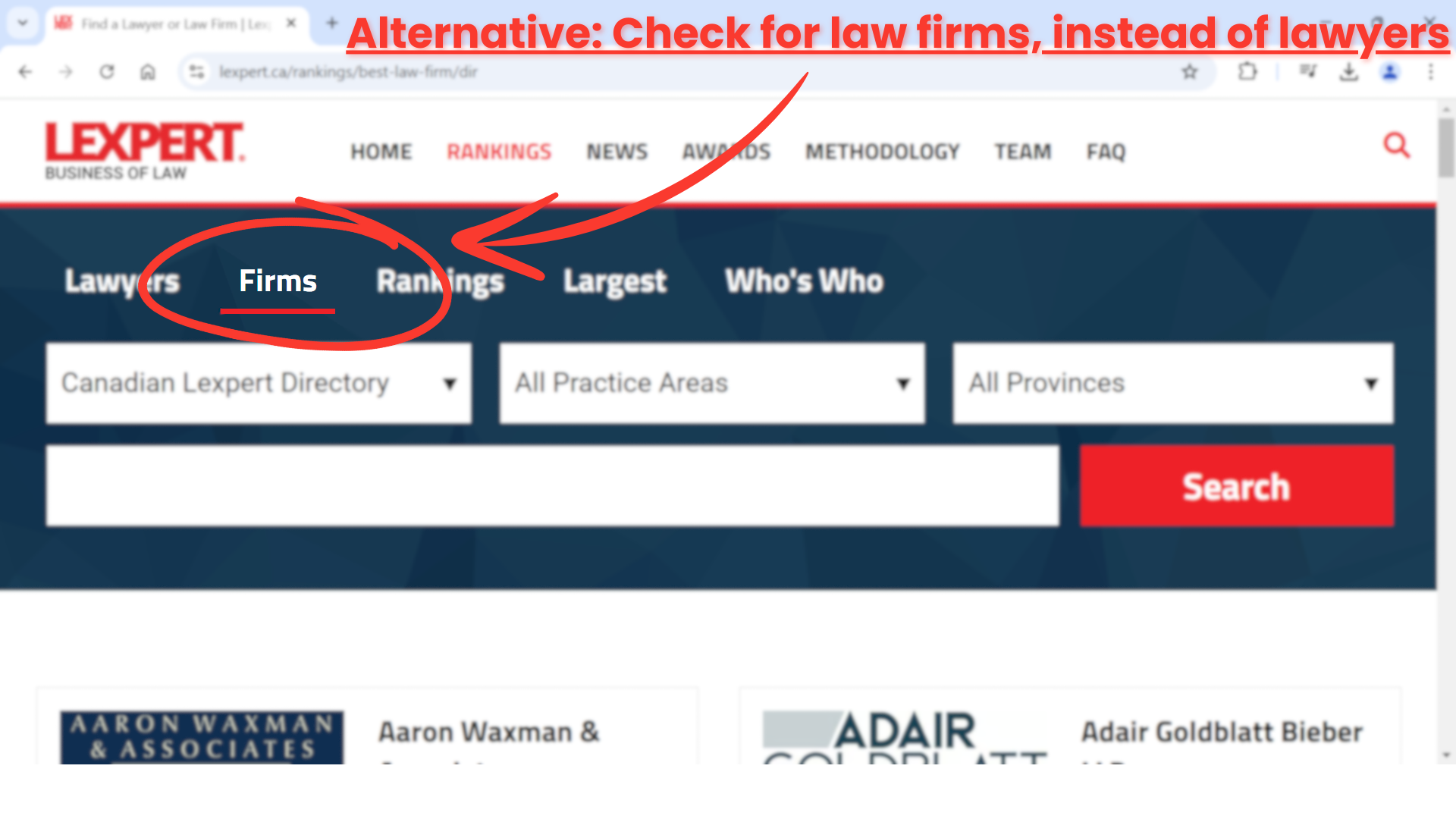
Finding a specialized lawyer
Specialized lawyers are experts in their own practice areas. They are certified by their law societies to be specialists in a field (or fields) of law. Almost all lawyers specialize in a particular practice area, since the law is broad and knowing everything all at once is just impossible.
Also, there are times when a lawyer will be honest with you and will refer you to another lawyer if your legal problem is not within their scope of practice.
For example, you think that your human rights are violated in the workplace. You know that you need to look for a workplace human rights lawyer near you.
This can also branch out to other practice areas such as occupational health and safety or workers’ compensation. This will then depend on your specific needs, but at least you know where to start. It's likely the workplace human rights lawyer you found is also knowledgeable on other aspects of employment law.
A tip on how to find a lawyer that specializes in a certain field: you can check special awards given to them, such as those given by Lexpert:
🏆 We're thrilled to announce McCarthy Tétrault LLP as the Commercial Litigation Team of the Year at #LawAwardsCA 2024!
— Lexpert (@Lexpert) May 10, 2024
Learn more here: https://t.co/SbclYXW2C7 pic.twitter.com/PFb7K182Sl
Look more on these awards by checking out our Canadian Law Awards page.
Where to look for specialized lawyers
Here's why our step #1 is important: if you know what you need (or at least you have an idea), you’ll know what legal area you’re going to look for a lawyer. For instance, on Lexpert’s Rankings page, there are around 67 practice areas to choose from. Without knowing who exactly to look for would be difficult.
But here’s another tip: you can also click on a law firm in the Lexpert directory so that you can see the practice areas they’re engaged in. Here’s an example of a law firm’s profile on Lexpert:
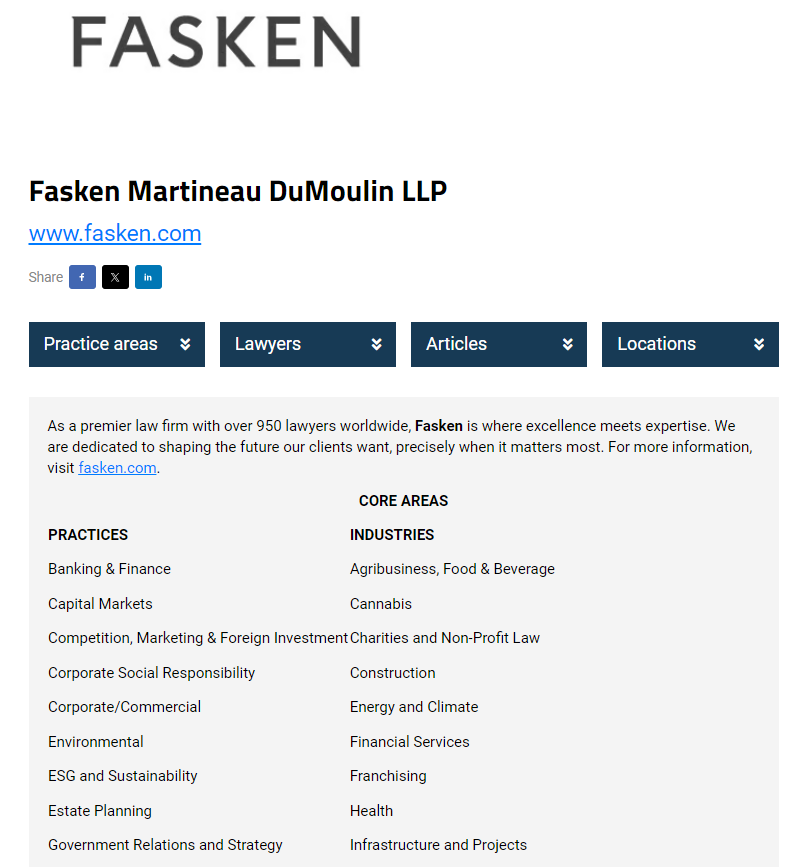
Advantages of looking for specialized lawyers
While there may be increased costs the more specialized a lawyer is, it’s safe to say that you’re in good hands. This does not mean that you’ll win your case or get what you want, but it’s an assurance that your lawyer knows what they’re doing. You’ll also get honest opinions that are legally sound about your case, compared to going to a lawyer in a different field of law.
3. Check the lawyer’s credentials and qualifications
After having your list of possible lawyers to contact, the next step is to check their credentials and qualifications. Below are some suggestions on where you can check your lawyer’s profiles:
- social media accounts: a simple Google search may be enough, which can show their profiles in social media and other websites
- profiles on their law firm website: you can look for the website of their law firm and check their profiles on it
- Lexpert’s individual directory: when clicking on the name of lawyers in Lexpert, it will show you their biography, publications, and contact details
Here's an example of a profile of a lawyer on Lexpert:
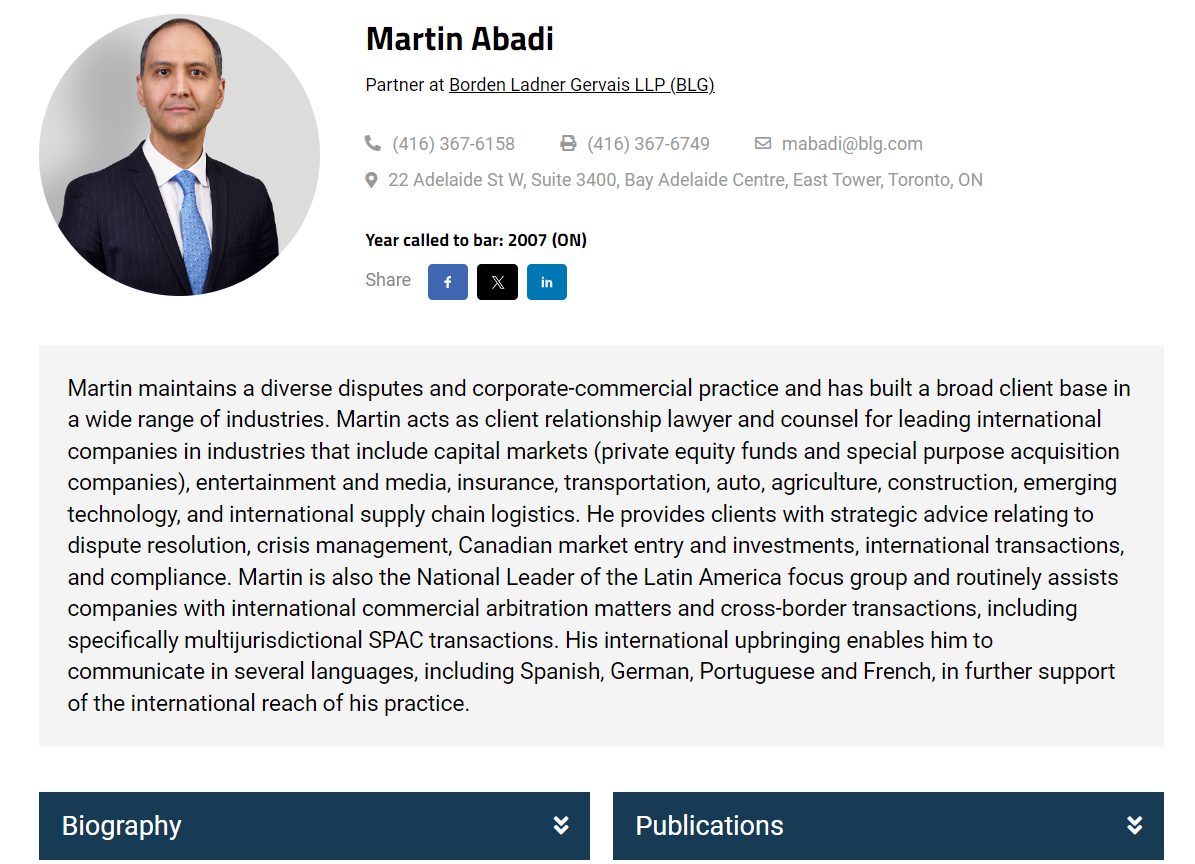
Evaluating a lawyer’s reputation and reviews
In assessing the credibility of your chosen lawyers, here are some guidelines you can use:
- extent of their knowledge in the practice area: some lawyers may practice for so long that they’re already well known in that practice area, or have written or spoken extensively on topics in this practice area
- past clients or representations: while their past cases are kept private, it’s not entirely prohibited, such as when exact names of clients are omitted; here, their reputation in their practice area can be assessed with their level of engagement
- continuing education: lawyers who pursued graduate degrees (e.g., LLM or PhD) related to the practice area they’re involved in is a sign that that lawyer has devoted not just their practical skill, but also their formal education, to that practice area
- community engagement: just like a referral, a good indicator that a particular lawyer is a good one is their reputation in the community, and this can be seen in their engagement outside their law firm (e.g., law societies, civic organizations)
4. Meet the lawyer
The next step when finding a lawyer is to meet those you think can help with your legal problem. Contrary to what you think, it’s not actually that difficult to contact a lawyer. You can directly contact them when their socials show their contact information. In a lawyer’s profile in Lexpert, for example, it shows their email address and telephone numbers.
What to do during an initial consultation
An initial consultation will probably be scheduled after you’ve reached out to your selected lawyer. Understandably, you would be anxious over this preliminary meeting, not to mention that the burden of your legal problem is still on you. To help ease these worries, here are some points to consider for this initial consultation:
- bring all relevant documents: even though it’s an initial consultation, it’s still wise to bring everything that is related to your case (e.g., contract, pictures, videos)
- prepare questions to ask: list down every detail that you want to know about the case, no matter how small those details are
- be clear on what you want or need: going back to our step #1, this is helpful since both you and the lawyer are levelled off about the case moving forward
5. Assess the possible lawyer-client relationship
When assessing whether to hire a lawyer or not, you can also look at the red flags of lawyers that you need to be on the lookout for. Below are some of these red flags:
- unethical assurances: there’s a big difference when your lawyer says that they’ll take care of the matter, versus when they say that they know someone who can assure you of winning the case
- excessive advertisements: while lawyers are allowed by law societies to advertise their services, there are still some restrictions on this. Even if it’s allowed, look out for lawyers who do excessive and distasteful ads (e.g., using self-proclaimed nicknames)
Reputable and reliable lawyers do not do any of these things. This is why it’s important to only look for lawyers and law firms in trustworthy sources, such as Lexpert’s directory of lawyers.
How does a lawyer-client relationship work?
Once you’ve chosen your lawyer after following the above steps on how to find a lawyer, now what? Well, the next thing to know is how a lawyer-client relationship works and what its legal implications are. These include:
- legal fees and costs: know how much your lawyer’s fees are, and if they’re reasonable enough given the complexity of your case
- understanding lawyer-client privilege: know the confidentiality privilege that your lawyer is bound to
- changing or replacing your lawyer: know the instances when you can fire your lawyer, and the ways that they can fire you
How to find a lawyer: legal points to consider
Navigating through a labyrinth of laws is difficult, which is why we have lawyers to help us through our legal endeavours. Choosing the best and most fitting lawyer for your legal matter is important. This is why we have online tools such as Lexpert’s directory of lawyers to help you find the best lawyer for your case.
Check Lexpert’s Legal FAQs page for more tips on how to find a lawyer and some basic explainers about Canada’s laws.


